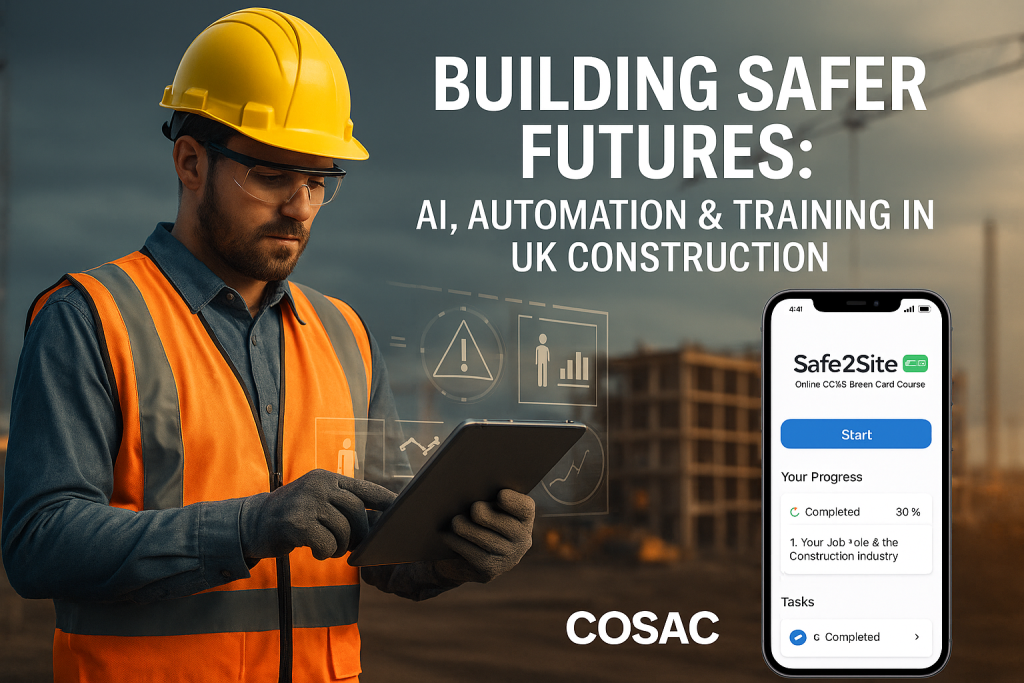
In a surprising yet encouraging shift, more than three-quarters of UK construction workers (78%) now trust AI and automation to enhance workplace safety, according to recent research released on World Day for Safety and Health at Work. This change in perception signals a broader industry movement towards adopting smart technologies to protect frontline workers.
The study, commissioned by SafetyCulture, highlights how attitudes among construction professionals are evolving. Despite common fears surrounding job displacement, workers show a clear preference for innovation—especially when it helps to keep them safer on the job.
When asked about the role of AI on-site, UK construction workers responded positively. A significant number see potential for AI to predict and prevent accidents (38%), identify risks that may go unnoticed by human eyes (35%), and even take on high-risk tasks (30%).
This growing trust in construction safety technology reflects a practical understanding of how artificial intelligence in construction can reduce incidents and injuries. It’s no longer about if AI will be part of the job—but when, and how.
Notably, emotions like curiosity and hope outpaced fear or scepticism, pointing to an overall cultural shift in how construction teams approach digital transformation.
Despite their optimism, workers also voiced valid concerns about automation in construction. Top worries included job losses (45%), machines operating without human input (38%), and the risk of faulty tech creating new hazards (30%).
However, the majority of workers (58%) support AI being used to provide insights or instructions—just not to make final decisions. This highlights a key insight: construction workers are open to technological assistance, as long as human judgment remains central to site operations.
Encouragingly, workers also appear to place trust in their leaders when it comes to the adoption of new technology. More than half (54%) trust management to make the right decisions around implementing AI, compared to just 16% who do not.
This trust opens the door for construction companies in the UK to begin rolling out AI solutions more confidently. Communication, however, remains a critical factor. As Alex Brooks-Sykes, SafetyCulture’s UK & Ireland lead, noted: “Being open and transparent is key. Communication is an area workers say their employer can improve on.”
As the construction industry shifts toward tech-driven safety measures, training must evolve too. This is where COSAC’s Safe2Site Online CSCS Green Card Course plays a pivotal role.
Unlike traditional classroom-based training, Safe2Site is fully remote and mobile-friendly. Learners can access the course from their smartphone, tablet, or laptop—giving them flexibility and control over their learning schedule.
This approach aligns perfectly with how today’s workers want to engage with technology. It provides the freedom to learn anytime, anywhere, whether on a lunch break, commute, or from home. It’s not just convenient—it’s also inclusive, making safety training more accessible across the construction workforce.
By embracing digital platforms like COSAC’s Safe2Site, companies can upskill teams faster, more affordably, and with better engagement. It’s a prime example of how digital tools can support construction site safety while empowering workers with certified, government-recognised credentials.
With the UK construction industry under increasing pressure to improve safety, reduce downtime, and protect workers, technology is becoming a cornerstone of progress. AI, when integrated thoughtfully, doesn’t replace people—it enhances their ability to do their jobs more safely and effectively.
Smart wearables, predictive analytics, and AI-driven monitoring systems are just a few examples of how AI is transforming construction sites. These innovations don’t just reduce accidents—they also provide real-time insights that help management make informed decisions quickly.
As long as the industry continues to prioritise communication, collaboration, and human oversight, the benefits of AI and automation will far outweigh the risks.
From mobile-first training platforms like COSAC’s Safe2Site to AI-powered safety protocols, the construction industry is finally seeing a merger of digital transformation and human wellbeing.
The key takeaway? Construction safety and technology don’t have to exist in opposition. When used wisely, tools like AI can safeguard lives, reduce risks, and empower workers—while platforms like Safe2Site ensure they’re equipped with the knowledge to thrive in a digital workplace.
As we look to the future, one thing is clear: AI in construction isn’t just about innovation—it’s about protecting people, promoting smarter practices, and preparing the next generation of workers to succeed safely.